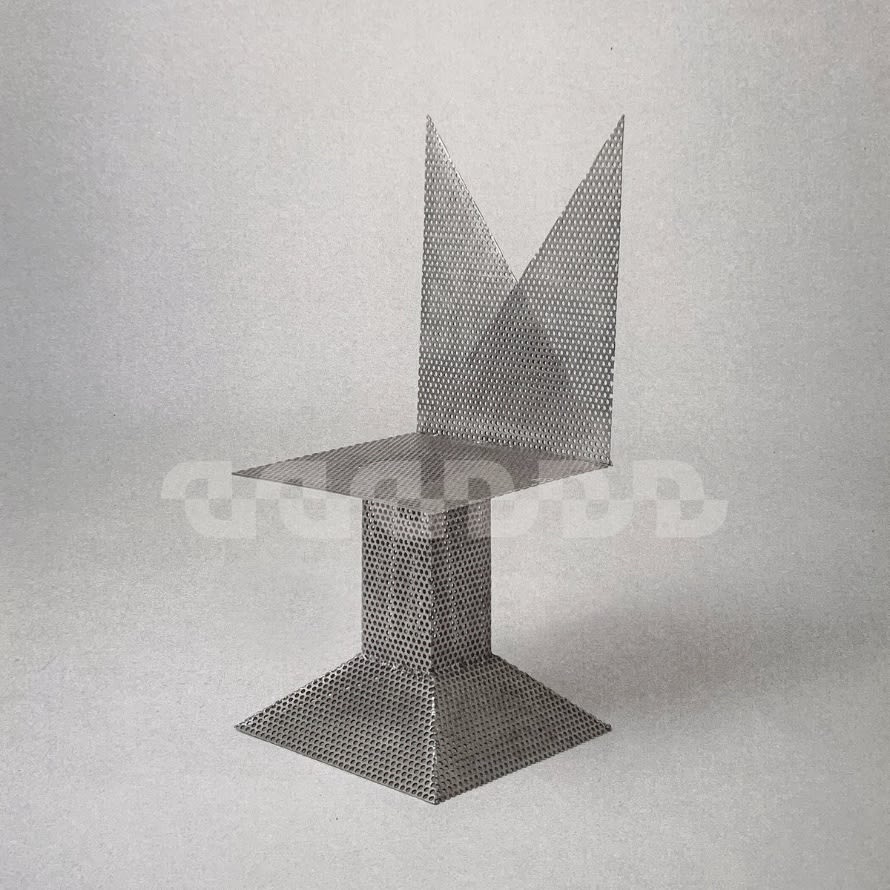You wouldn't know it from Luciel Brown's cold and inert delivery, but an intense anxiety binds Drahla's seedy and seemingly despairing new record angeltape, the long-awaited follow-up to 2019's Useless Coordinates. It's the kind of anxiety that feigns composure without ever indicating what really lies beneath; Drahla have mastered making sense of chaos, even at the risk of further unearthing the tumultuous interior.
When things go discordant, overwhelmed with aimless barbs of guitar and extraneous hiss and fuzz, Drahla bring the disgruntled sonic flourishes of angeltape together in miraculous harmony. It's reflective of their past half-decade, with the Leeds collective having faced immense loss, braving more grey days than most leading up to the record's release. But they've come out the other end more actualized as a band, attuned to whatever devastation may inevitably lie ahead. As disjointed and tense as this sophomore effort may come across, angeltape is a proclamation of artistic and emotional resilience.
This period between records allowed Drahla to dismantle and challenge the creative limitations of Useless Coordinates — a record that saw the band yield to well-loved, blue-printed post-punk — to clear the way for a new vision motivated by a newly lax approach to form and expectation. After all, rolling with the punches of drudgery and destruction sounds much more fun than anticipating it in avoidance only to end up encountering it down the road.
Throughout the record, most notably on tracks like "Talking Radiance" and closer "Grief in Phantasia," listeners are required to dart through angeltape's loose, abrasive tactics: Rob Riggs's driving bass barely keeps up with the spry percussion of Mike Ainsley, while Chris Duffin's squalling saxophone bites through any assumed semblance with food-aggressive snaps, Brown and Ewan Barr's guitars imploding into a noisy haze to offset the unbothered sullenness of Brown's voice. This clashing atmosphere indicates an internalized acceptance of the messy, a demand to embrace uncertainty.
By eschewing a traditional sense of rhythm, melody and the motorik drive that's served their music thus far, Drahla also relinquish control of the cankerous questions that twisted and turned within while navigating personal turmoil. On "Lipsync," we're invited into Brown's mental labyrinth, one strangled by an overgrowth of feelings at odds with each other. Full of self-doubt and a yearning for belonging in a misaligned world, Brown articulates these simultaneous forces of desire and repulsion with stirring precision, "Is there an angle in which I can align? / Is there some sentiment in which I should resign?"
Elsewhere, Brown's reflections plunge deeper, turning ever inward toward a curiosity that feels overwhelmingly self-scrutinizing. "Do I look okay when I'm in the rain?" Brown sings obsessively on "zig-zag." This level of self-awareness and acute perceptiveness borders on paralyzing paranoia — "Skin is scorched / Can't you see it's on fire?" Brown asks on "Under the Glass," as though spurring herself into action.
These distressed queries are extended further into spirals of abstraction, a weighty poeticism that sometimes leaves little to grasp onto emotionally. But when combined with constantly bending music so fractured and unsettled, the record's indwelling grief and doubt is magnified. "Under the Glass" echoes Brown's anxious words with a new-found liveliness in the band's sound, unconcerned of its own heaviness. The track is possessed by saxophone that groans as if setting the scene of impending war or a sinister ritual before halfway through evolving and splintering apart, driven by a brute terror and a coexistent playfulness.
"Talking Radiance" traces similar confines with tinny guitars, whose throaty timbre roars right into "Concrete Lily" with a spell-bound aftershock that'll leave heads buzzing. But not all tracks here are as cacophonous and disorderly. "Venus," even though it deviates a bit too far from the record's charged dissonance, is a mournful, slow-moving piano and synth track with haunting vocal manipulation that envisions an odd kind of paradise amidst angeltape's aural disarray. It's the musical equivalent of a serene wasteland frozen in the aftermath of destruction, and if nothing else, a bit of a breather before the monstrous closing number, "Grief in Phantasia," is dispatched.
The curtain-closing moment is a compulsive tidal wave of everything the band has hinted at in the tracks leading up. Its no-wave vastness and apparent futility are an unrelenting, non-negotiable force that drives and drives — but there's no end in sight. Residual uncertainty and fear disintegrate any sense of structure, so disorderly that it twists your brain into a knot as it seeks resolve. Like the band themselves, you'll likely find yourself simply trying to make sense of the mess. But no matter when and how often things go awry, however heavy and persistent the destruction may feel, the album's closing refrain, "What happens all the time is not what happens all the time," offers an oddly hopeful conclusion to a record that knows the depths of despair all too well.
